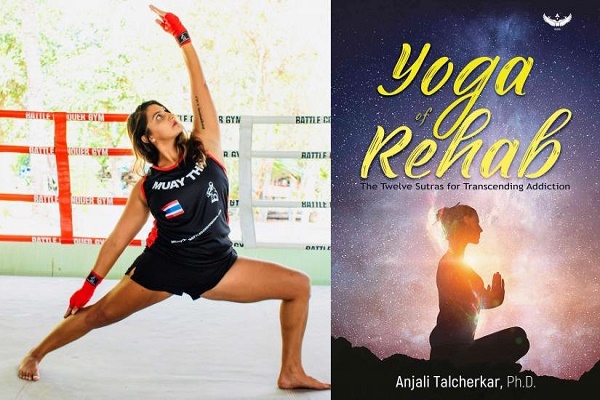
Follow us Now on Telegram ! Get daily 10 - 12 Interesting Updates. Join our Telegram Channel https://t.me/OhWomen
Download Telegram App before Joining the Channel
Is the power of yoga, meditation and conscious shift towards spirituality enough to pull someone back from the deepest pits of drug addiction and alcoholism? The powerful and intense real-life story of Anjali Talcherkar, told vividly in her new book "Yoga of Rehab: The Twelve Sutras for Transcending Addiction" is a testimony to the life-changing potential of the yogic way of life.
Talcherkar, born to Eastern Indian parents and raised in a rural farm town near Illinois, US, turned to alcohol and drugs in late teenage years, falling deeper into the nexus of pills, drinks and denial about her addiction. In the book, the author explains how she was doing the rounds between relapse and self-discipline, supported by peers, parents and mental healthcare practitioners. During rehabilitation, she met and married her husband, who she eventually lost to a drug overdose. Having hit rock bottom, Talcherkar finally found her 'blessing', and began her arduous journey from the dark to the light.
"Yoga of Rehab" is the brave story of Talcherkar climbing out from the dark abyss of addiction. The path of yoga, meditation and SKY (Sudarshan Kriya Yoga) helped her recover. Today, she is out of addiction, is a certified yoga teacher and has obtained a Doctorate in Integrative Medicine. The book also details specific asanas (having specific mantras and mottos), besides some practical tasks for the readers.
Anjali Talcherkar in conversation with IANSlife:
Q: In the book, you detail the profound impact yoga and meditation had in your life, especially in deaddiction. When were you first introduced to it? What about it moved you to quit and start afresh?
A: I was first introduced to yoga meditation in my early 20's. I followed predecessors like Deepak Chopra and others until I was introduced to the Art of Living foundation in 2005 through my mother, who was a devotee. It was a time in my life when I was really struggling with addiction and traditional methods like therapy and medication could only go so far. I feel yoga and meditation reached deeper levels, helping me release trauma and underlying emotional issues causing the addictive pattern. Once I started to feel healthy mentally, physically, and emotionally, this was a new level of freedom I hadn't experienced before. Yoga and meditation showed me the doorway to Self. Once in touch with Self, inner contentment results -- there is no longer a need to intoxicate yourself with external substances. This is the freedom I experience today in my life.
Q: You also mentioned that the nomenclature of an 'addict', or a 'hardcore addict' can be stigmatizing. Across borders, where do you think we could strengthen institutional support for people struggling with drug addiction?
A: Yes, absolutely. Labels do no justice in describing or identifying who you really are at your core. No words or labels can. I think people form an identity around the label and then have a hard time letting it go, even years after being free from the addiction. We can see humans as more than a label and level the playing field. All humans experience struggles in life, but to marry them to a label permanently is simply pathologizing and counterproductive. Of course, this is how the Western medical paradigm operates for many reasons, including profitability. There's more money in treating addiction vs curing it. So, let's start by taking the hype out of addiction (i.e., normalise it). Because lets' face it, the world has a propensity toward addictions (food, drugs, relationships, the internet, etc.) the list could go on ad infinitum. In short, there is a need to shift the current medical paradigm and disease ideology.
Q: Both yoga and meditation are considered alternate therapies. Being a yoga coach and CAM expert, do you feel the need to mainstream access to such treatments, both in the US and in India?
A: Yes, I do because these modalities work. Point blank. I've worked in several different rehabs over the years, and I have seen CAM treatments slowly finding their way into treatment centers, which is very positive. The main issue is the lack of insurance coverage for such treatments. Generally, unless CAM interventions are offered within the treatment program itself, people pay out of pocket. So, basically, there is a need to mainstream CAM modalities, make them accessible to underserved populations, and affordable to the masses.
Q: Finally, after every relapse, what kept you going and striving towards health and deaddiction?
A: I will preface my response by stating upfront that I do not see relapse as a failure. Sometimes people need to take a few steps back to move ahead, and that is fine: it's a personal journey. In my coaching work, I refer to a harm-reduction model, meaning abstinence could be one goal but not necessarily uniform for everyone. Some people want to cut back for a while and that works for them. While conducting my doctoral research, I re-introduced alcohol back into my life in a moderate and responsible manner. I was abstinent for 6 years until I made that decision; my view on addiction changed through my academic research. Sobriety does not necessarily mean abstinence and vice versa. If you look up the definition of sobriety, it reads, "of sound and reason mind." I don't consider myself an addict in recovery anymore because I have healed myself.
Source - IANS